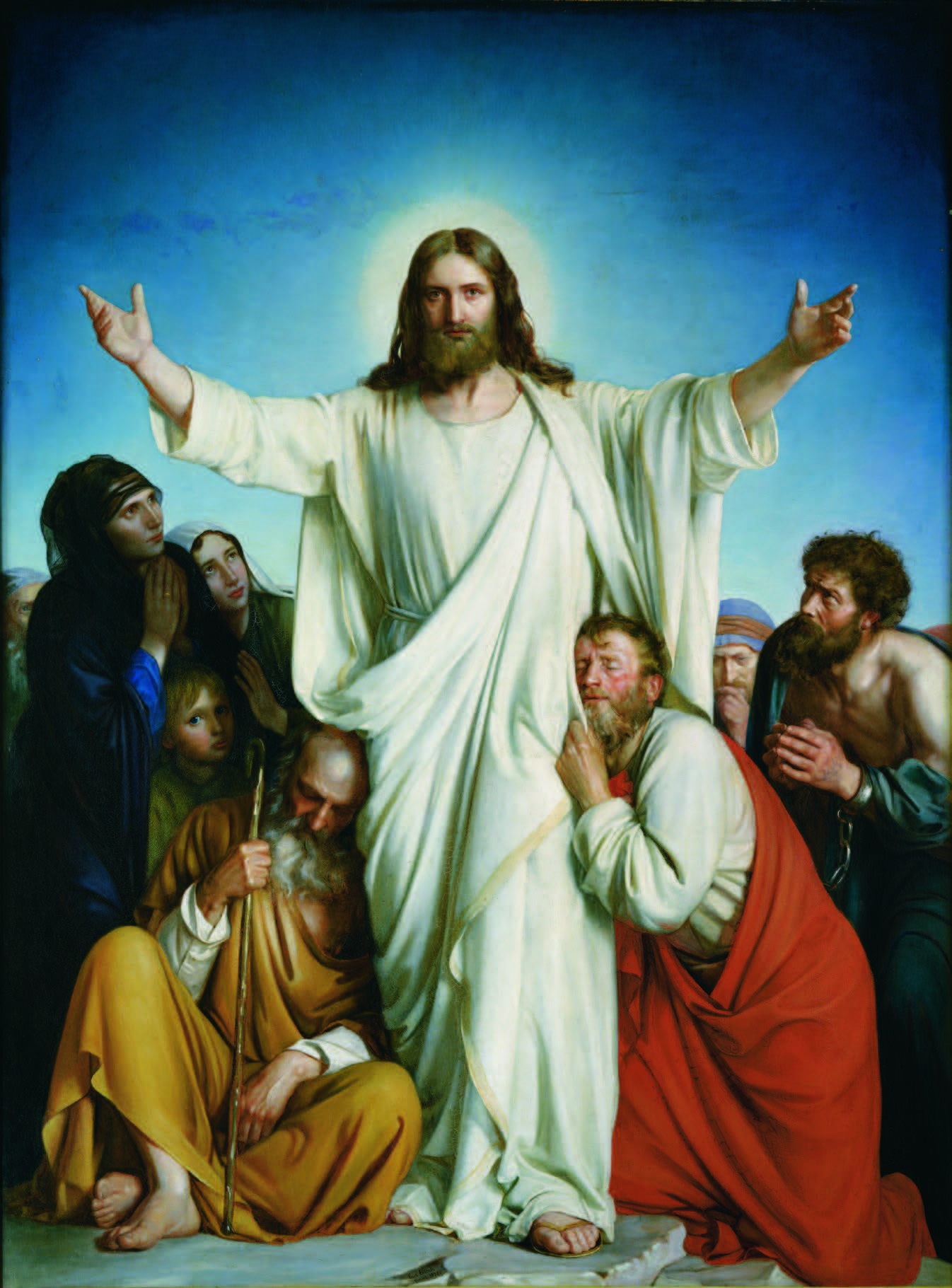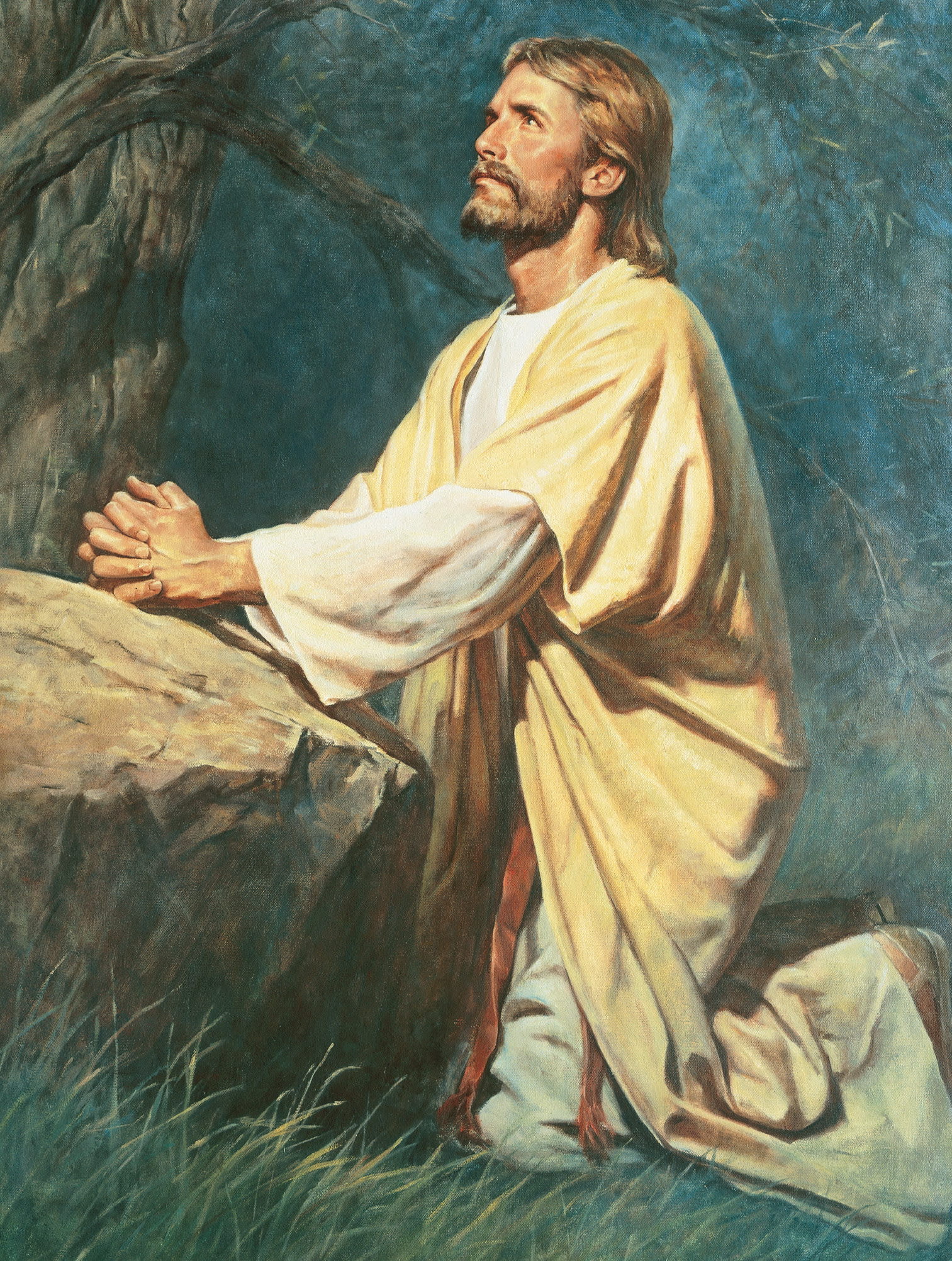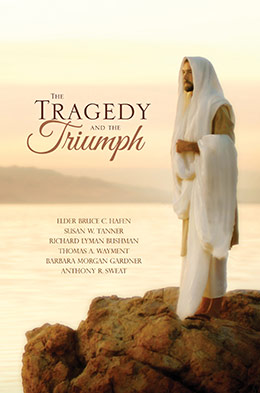Christ's Power to Perfect Us
Barbara Morgan Gardner
Barbara Morgan Gardner, "Christ's Power to Perfect Us," in The Tragedy and the Triumph, ed. Charles Swift (Religious Studies Center, Brigham Young University; Salt Lake City: Deseret Book, 2019), 83–102.
Barbara Morgan Gardner was associate professor of Church history and doctrine at Brigham Young University when this was written.
Every semester my students write a paper analyzing a Christlike attribute, apply that attribute, and interview with me regarding what they learned and became as a result. As part of their assignment, these students produce an artifact—such as a video, journal, photo, or dance performance—to represent their experience. One of my favorite interviews occurred with a young woman who chose to study and apply the Atonement of Jesus Christ, rather than selecting a specific attribute. After our interview, I asked to see her product. With a huge smile and tears running down her checks, she stood up and said, “It’s me!” She explained that as she applied the Atonement of Jesus Christ, she began praying more frequently, thinking of him more often, relying on and trusting him, and desiring to become like him. “I’m a different person, I’m a better person, because of him I’m becoming like him and I’m happier than I’ve been in a long time.” The miracle that had occurred in her life as she used her agency to learn and apply the Atonement of Jesus Christ became obvious.
President Russell M. Nelson explained that Jesus Christ gave his life for us “so that we could have access to godly power.” He then taught, “The more we know about the Savior’s ministry and mission—the more we understand His doctrine and what He did for us—the more we know that He can provide the power that we need for our lives.” Then, as we act upon that knowledge, especially regarding the Savior’s atoning sacrifice, mission, and character, “we choose to have faith in him and follow him.” That faith then motivates us to more action and gives us even “more access to His power.”[1]
In one of the greatest revelations regarding the potential of mankind, the Lord taught, “Then shall they be above all, because all things are subject unto them. Then shall they be gods, because they have all power” (Doctrine and Covenants 132:20). If power is fundamental to being a god, gaining a greater depth of knowledge and understanding regarding the principles of Christ’s power and applying these principles in our path to godhood is critical. Although there are many principles of power, we will look at just three as they relate to both Jesus Christ and us.
Christ’s Dual Nature
 Walter Rane, Add to Faith
Walter Rane, Add to Faith
Abinadi, in his final discourse on Christ, declared, “Because he dwelleth in flesh he shall be called the Son of God, and having subjected the flesh to the will of the Father, being the Father and the Son—the Father, because he was conceived by the power of God; and the Son, because of the flesh; thus becoming the Father and Son.” Abinadi continued, “Yea, even so he shall be led, crucified, and slain, the flesh becoming subject even unto death, the will of the Son being swallowed up in the will of the Father. And thus God breaketh the bands of death, having gained the victory over death; giving the Son power to make intercession for the children of men” (Mosiah 15:1–9).
Indeed, it was this dual nature of Christ as both God and mortal that gave him power over death and enabled him to be perfect, which in turn allowed him the power to perfect us. Elder Orson F. Whitney explained, “Our little afflictions are but a drop in the ocean, compared with the infinite and unspeakable agony borne by him for our sakes because we were not able to bear it for ourselves.”[2]
Perfection through Christ
“I’ve put everything I can into it,” one student lamented to me. “I’ve read my scriptures, prayed, attended the temple, tried to be perfect in every way. It’s exhausting. I just can’t do it anymore. I can’t explain it. I need to figure things out for myself. I’m taking a break.” My heart agonizes for this student and many like him who, overwhelmed by life’s demands and Satan’s ever-present temptations, realize that they simply can’t do it alone. I have come to understand that many of them lack a fundamental ingredient to resolving their struggles: focusing on Christ.[3]
 Carl Bloch, Christ the Consolator.
Carl Bloch, Christ the Consolator.
In fact, many students misunderstand Alma’s invitation to experiment upon the seed, comparing the seed to faith, not understanding that Alma teaches that the seed to be experimented on is “the Son of God” (Alma 33:21). President Nelson has specifically invited us to learn more of Christ and promised that those who do so will receive power from on high.[4] In the revelation known as The Vision, Christ taught of exalted beings in the celestial kingdom. He instructed, “They are they who received the testimony of Jesus, and believed on his name and were baptized” and have received “the fulness of the Father.” And then comes this humbling, most instructive verse: “These are they who are just men made perfect through Jesus the mediator of the new covenant, who wrought out this perfect atonement through the shedding of his own blood” (Doctrine and Covenants 76:51, 71, 69).
Perfection, and therefore exaltation, comes only through the Savior. Elder John Taylor taught that a man only has the powers within himself to become a man, but through the “essence and power of the Godhead, which is in him, which descended to him as the gift of God from his heavenly father, he is capable of rising from the contracted limits of manhood to the dignity of a god.” This is only possible, Taylor continued, “through a power which is superior to man—infinite power, an eternal power, even the power of the Godhead.”[5]
Moroni instructed that it is only through grace that we “may be perfect in Christ.” He taught that if we are “perfect in Christ, and deny not his power,” then we will be “sanctified in Christ by the grace of God, through the shedding of the blood of Christ, which is in the covenant of the Father unto the remission of your sins” (Moroni 10:32–33).
As President Nelson recently instructed, we “increase the Savior’s power in our lives when we make sacred covenants and keep those covenants with precision. Our covenants bind us to Him and give us godly power.”[6] We don’t earn his grace—it is Christ himself who fulfills the covenant if we allow him through the righteous use of our agency. C. S. Lewis painted a pragmatic picture of Christ’s fulfillment of his promise:
“Make no mistake,” [Christ] says, ‘if you let Me, I will make you perfect. . . . Whatever suffering it may cost you in your earthly life, whatever inconceivable purification it may cost you after death, whatever it costs Me, I will never rest, nor let you rest, until you are literally perfect.” . . .
. . . You must realize from the outset that the goal toward which He is beginning to guide you is absolute perfection.”[7]
As mortals, true perfection only comes “through Jesus the mediator of the new covenant, who wrought out this perfect atonement through the shedding of his own blood” (Doctrine and Covenants 76:69).
Christ’s Obedience to His Father’s Will
In premortality, Christ “suffere[d] himself to become subject unto man in the flesh” (2 Nephi 9:5). Prior to his entrance in mortality, he declared that he came “to do the will, both of the Father and of the Son” (3 Nephi 1:14). The last words Christ uttered in mortality, “Father, it is finished, thy will is done” (JST Matthew 27:54), were echoed as he spoke to the Nephites after his crucifixion: “I have suffered the will of the Father in all things from the beginning” (3 Nephi 11:11).
It seemed that whatever he desired was in complete line with his father’s will, and he had the power within himself to perform miracles at will—that is, until he desired something for himself. The plea to have “this cup pass from me” was his first utterance noted in scriptural text not in line with his Father’s will, and thus the humble and unique “nevertheless not as I will, but as thou wilt” becomes so powerful (Matthew 26:39). As Elder Neal A. Maxwell taught, cognitively he knew it all only as a God could, but experientially, as a mortal, his obedience was tested beyond compare. “Thus, when the agony came in its fulness, it was so much, much worse than even He with his unique intellect had ever imagined!”[8]
It is in submitting his will and power to the Father’s that he gained his greatest power. Indeed Christ’s many miracles performed while in mortality were swallowed up in the greatest miracle of all—the decision, ability, and act of turning his will over to the Father in his most critical hour, thus allowing for the salvation of all mankind and allowing us to increase in his power.
Power through Exercising Faith in Christ
 Del Parson, The Greatest of ALl.
Del Parson, The Greatest of ALl.
Lehi described three groups of people in his familiar scriptural dream. The third group “caught hold of the end of the rod of iron; and they did press their way forward, continually holding fast to the rod of iron, until they came forth.” Unlike the second group, who partook and fell away, this group “fell down and partook of the fruit of the tree” (1 Nephi 8:30). In other words, they acted in faith, and upon finding Christ, they fell at his feet.
It seems that those who continually hold fast show their desire to both know and exercise faith in the Lord. As they do so, their faith increases, and their power to obey him is enhanced until they recognize him. As Elder Maxwell taught, “Our deepest desires determine our degree of ‘obedience to the unenforceable.’”[9] Elder Dale G. Renlund instructed, “The closer we are to Jesus Christ in the thoughts and intents of our hearts, the more we appreciate His innocent suffering, the more grateful we are for grace and forgiveness, and the more we want to repent and become like Him.”[10]
President Nelson communicated the stretching necessary to receive God’s power. “When the Savior knows you truly want to reach up to Him—when He can feel that the greatest desire of your heart is to draw His power into your life—you will be led by the Holy Ghost to know exactly what you should do.”[11] The Savior himself understands what it means to stretch. “Jesus’ brief stumbling while carrying the cross is a reminder as to how close to the very edge of our strength God stretches us at times.”[12] It is this desire, coupled with our faith in Jesus Christ that “propels us to do things we otherwise would not do.” According to President Nelson, “For faith that motivates us to action gives us more access to His power.”[13]
With God, Nothing Is Impossible If It Be His Will
 Annie Henrie, Angels among Us. © Annie Henrie Nader.
Annie Henrie, Angels among Us. © Annie Henrie Nader.
“I failed,” my friend whispered as the nurse hesitantly pulled the life-saving plugs. Although caught off guard by these near final words, I was not astonished by her deeply held sentiment. Through the years I knew her, she believed and often quoted the scripture “For with God nothing shall be impossible” (Luke 1:37). She believed that if she exercised enough faith, the cancer would not take her. She, however, was missing a critical component to the principle: God’s will.
Even in his most bitter moment, Christ had the capacity and control to utter the most humble word nevertheless. Was he lacking in faith because at that moment seemingly no miracle was performed? Was he not righteous enough? Was he not exactly obedient? Did Christ fail because he did not save himself from death?
According to the Bible Dictionary, “The object of prayer is not to change the will of God but to secure for ourselves and for others blessings that God is already willing to grant but that are made conditional on our asking for them.”[14] Power or success does not come from God performing a miracle based on our faith. The success lies in our asking and accepting his will through the refining trial. The righteous change in us becomes the miracle.
President Kimball pragmatically illuminated the importance of the phrase “Thy will be done.” He explained that if he himself had “limitless power, and yet limited vision and understanding,” he might have saved Abinadi from the fire and deflected the bullets that martyred the Prophet and Patriarch in Carthage Jail but thus “lost the martyr’s death and reward.” President Kimball adds, “I might have saved [Christ] from suffering and death, and lost to the world his atoning sacrifice,” frustrating the whole program.[15]
Is it possible that perhaps the miracle is a change of character to become more like Christ? Patience through suffering, love through experience, forgiveness through sin? Was the miracle in the healing of the ten or in the one “made whole”? Was the miracle in the feeding the five thousand or in the conversion of his disciples? As Lorenzo Snow confirmed, “It required all the power that He had and all the faith that He could summon for Him to accomplish that which the Father required of Him.”[16] Elder Maxwell instructed, “Consecration thus constitutes the only unconditional surrender which is also a total victory!”[17] In this total victory God pours out infinite power.
Perfection and Power
The Savior went from grace to grace until he received a fulness of the Father and “received all power, both in heaven and on earth” (Doctrine and Covenants 93:17). Elder Tad R. Callister instructed, “The Savior exercised power as He endured the consequence of sin, withstood pain, and eventually relinquished his life. . . . The exercise of those powers necessary to endure the suffering of all mankind may in turn have opened the door to the additional powers needed to resurrect, to redeem, and to exalt.” Elder Callister continued, “Out of the death of One was born the everlasting life for all.”[18]
Clearly, as Alma taught, Christ suffered for our “afflictions and temptations of every kind,” but it seems that it was not only in his power to do so but also in his willingness that he gained greater power. In fact, Alma continues, “[Christ] took upon him death, that he may loose the bands of death” (Alma 7:11–12). Was it the mortal experience of our temptations, sins, infirmities, weakness, and even death that gave him the power to overcome?
It is important to recognize that Christ also overcame his own temptations. As Christ withstood, or in fact “gave no heed,” to the temptations of Satan in his younger years (Doctrine and Covenants 20:22), he was more empowered to fight the temptations of Satan at the cross, when he was left alone, with no power to draw upon but his own. C. S. Lewis perhaps enhances this principle of power in relation to Christ. “No man knows how bad he is till he has tried very hard to be good. . . . Only those who try to resist temptation know how strong it is, . . . and Christ, because He was the only man who never yielded to temptation, is also the only man who knows to the full what temptation means—the only complete realist.”[19]
It was at that moment on the cross, when the agony of Gethsemane returned and crowded in upon his physical pain, that Christ’s true powers were manifest. In his darkest hour was his power most brilliantly manifested in mortality. His obedience to his Father’s will gave him power to obey when the temptation to falter was strongest. His offering of succoring power throughout his life manifested itself in the succoring he assured to his mother and others, when he himself needed it most. The Savior’s power to draw men unto him was never more apparent than when he, on the cross, gave hope to the most vile of sinners. “Character,” according to Elder David A. Bednar, “is demonstrated by looking and reaching outward when the natural and instinctive response is to be self-absorbed and turn inward.” He concluded, “The Savior of the world is the perfect example of such a consistent and charitable character.”[20] Indeed, it was Christ’s infinite attributes, capped in his infinite love, that allowed such suffering, but also provided infinite power: power to resurrect, power to redeem, power to exalt. As Christ grew in his infinite attributes, he gained the infinite power to perform his infinite atonement.
Accessing Christ’s Power by Becoming Like Him
 Welden C. Andersen, Self Reliance.
Welden C. Andersen, Self Reliance.
I have had many opportunities to be present when loved ones have crossed to the other side of the veil. One was my own mother. Two experiences at the time of her passing demonstrate this truth regarding character, that of “looking and reaching outward when the natural and instinctive response is to be self-absorbed and turn inward.”
I remember my mother aspirating as a result of the radiology she was exposed to as she battled brain cancer. Upon awaking from a medically induced coma, with a tube still down her throat, she asked for a piece of paper. “How is Susan?” she scribbled. Susan was struggling with terminal lung cancer. My mother’s immediate concern was for someone similarly suffering. Her next note was a cheerful recognition of my birthday.
My second example happened the morning following the night my mother passed away. My father, exhausted and alone, was determined to attend his granddaughter’s wedding that same morning. As we drove with him across the city to the temple, a driver behind us prolongingly blasted his horn and yelled at my Dad’s slow and perhaps inconsistent driving. Before I had a chance to do anything regretful, my father said, “I feel for that man. Perhaps his wife passed away this morning too.”
 Walter Rane, Jehovah Creates the Earth.
Walter Rane, Jehovah Creates the Earth.
Elder Bednar explained that character is revealed “in the power to reach out and extend compassion for the spiritual agony of others when we are in the midst of our own spiritual distress.”[21] Were these not the qualities we saw in Christ, the qualities that made him perfect, the qualities we wish ourselves to emulate?
Elder Callister taught, “It should be no surprise that as we become more godlike we become more powerful. . . . The acquisition of each divine trait brings power. Power and godhood are directly related.” To this thought he added, “The atonement was both an exercise of power and an acquisition of power. . . . As we exercise power in righteousness, we acquire more power.”[22]
Conclusion
In order to become like him, taught President Nelson, “Our focus must be riveted on the Savior and His gospel.”[23] So we make Jesus Christ the center of everything—“we talk of Christ, we rejoice in Christ, we preach of Christ, we prophesy of Christ, and we write according to our prophecies” (2 Nephi 25:26). In addition, we learn of Christ, rely on Christ, trust Christ, exercise faith in Christ, apply the teachings of Christ, and act like Christ, and as we do so, our ability to become like Christ will increase, as will his power in us. We too then, in our final interview, will be able with glee to shout “It’s me!” knowing that this new powerful, perfected self is only possible through him.
Notes
[1] Russell M. Nelson, “Drawing the Power of Jesus Christ into Our Lives,” Ensign, May 2017, 39–41.
[2] Orson F. Whitney, Baptism—The Birth of Water and of the Spirit (Salt Lake City: The Church of Jesus Christ of Latter-day Saints, 1953), 4.
[3] For a thorough discussion on helping students focus on Christ, see Henry B. Eyring, “And Thus We See: Helping a Student in a Moment of Doubt,” address to CES Religious Educators, 5 February 1993, Temple Square Assembly Hall.
[4] Nelson, “Drawing the Power of Jesus Christ into Our Lives.”
[5] John Taylor, The Mediation and Atonement of Our Lord and Savior Jesus Christ (Salt Lake City: Deseret News, 1892), 141.
[6] Nelson, “Drawing the Power of Jesus Christ into Our Lives,” 41.
[7] C. S. Lewis, The Joyful Christian (New York: Scribner Paper Fiction, 1984), 77–78.
[8] Neal A. Maxwell, “Willing to Submit,” Ensign, May 1985, 72–73.
[9] Neal A. Maxwell, “‘Swallowed Up in the Will of the Father,’” Ensign, November 1995, 24.
[10] Dale G. Renlund, “‘That I Might Draw All Men unto Me,’” Ensign, May 2016, 40.
[11] Nelson, “Drawing the Power of Jesus Christ into Our Lives,” 42.
[12] Neal A. Maxwell, Things As They Really Are (Salt Lake City: Deseret Book, 1978), xii.
[13] Nelson, “Drawing the Power of Jesus Christ into Our Lives,” 41.
[14] Bible Dictionary, “Prayer.”
[15] Spencer W. Kimball, “Tragedy or Destiny?,” in Teachings of Presidents of the Church: Spencer W. Kimball (Salt Lake City: Deseret Book, 2006), 11–21.
[16] Lorenzo Snow, quoted in Tad R. Callister, The Infinite Atonement (Salt Lake City: Deseret Book, 2000), 115.
[17] Maxwell, “Swallowed Up in the Will of the Father,” 24.
[18] Callister, Infinite Atonement, 70–71.
[19] C. S. Lewis, Inspirational Writings of C. S. Lewis (New York: World Publishing, 2004), 337–38.
[20] David A. Bednar, “The Character of Christ” (BYU–Idaho devotional, 25 January 2003), http://
[21] Bednar, “Character of Christ.”
[22] Callister, Infinite Atonement, 70.
[23] Nelson, “Drawing the Power of Jesus Christ into Our Lives,” 41.
